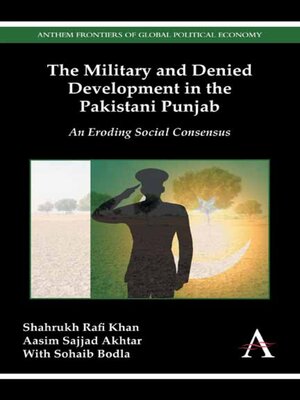The Military and Denied Development in the Pakistani Punjab
ebook ∣ An Eroding Social Consensus · Anthem Frontiers of Global Political Economy and Development
By Shahrukh Rafi Khan

Sign up to save your library
With an OverDrive account, you can save your favorite libraries for at-a-glance information about availability. Find out more about OverDrive accounts.
Find this title in Libby, the library reading app by OverDrive.



Search for a digital library with this title
Title found at these libraries:
| Library Name | Distance |
|---|---|
| Loading... |
This book focuses on the retrogressive agrarian interventions by the Pakistani military in rural Punjab and explores the social resentment and resistance it triggered, potentially undermining the consensus on a security state in Pakistan. Set against the overbearing and socially unjust role of the military in Pakistan's economy, this book documents a breakdown in the accepted function of the military beyond its constitutionally mandated role of defence. Accompanying earlier work on military involvement in industry, commerce, finance and real estate, the authors' research contributes to a wider understanding of military intervention, revealing its hand in various sectors of the economy and, consequently, its gains in power and economic autonomy.
|Military power has long been a serious obstacle to a sustained democracy in Pakistan. The authors investigate the Pakistani military's retrogressive agrarian interventions in the Punjab, and outlines a change, as recognised by society, in the military's rightful function within the economy.
Set against the social resentment instigated by the military's agricultural land grabbing, and a burgeoning resistance to the military's overbearing and socially unjust role in Pakistan's economy, this book supplements a larger body of work detailing the military's hand in industrial, commercial, financial and real estate sectors. Any gain in economic autonomy wielded by the military makes it less answerable to civilian oversight, and makes it more likely to act to protect its economic interests.
The survival of civilian rule in Pakistan, which is critically important for the foreseeable future, requires a fundamental reordering of the balance of power between state institutions, and between state and society. Pakistan, long encumbered by the military yoke, has witnessed its first peaceful transition from one political administration to another; and in a move congenial to the consolidation of this democratic process, 'The Military and Denied Development in the Pakistani Punjab' exposes the nefarious nature of the military's predation, and signals a move for the military to be contained to its constitutionally mandated role – defence.







